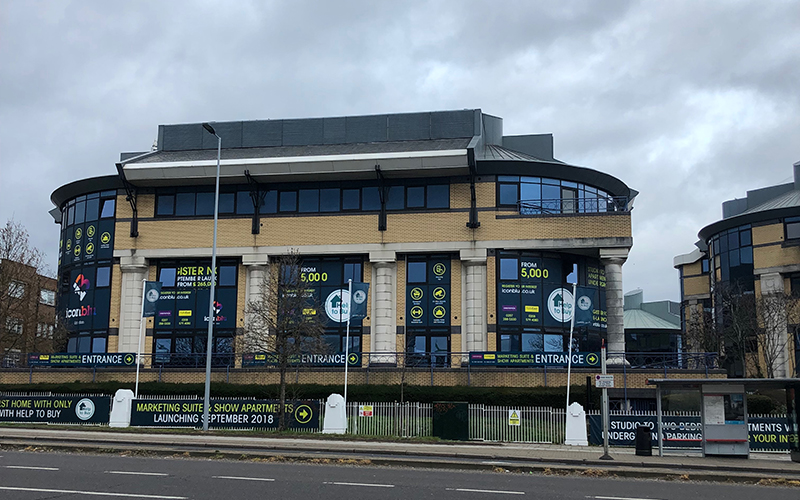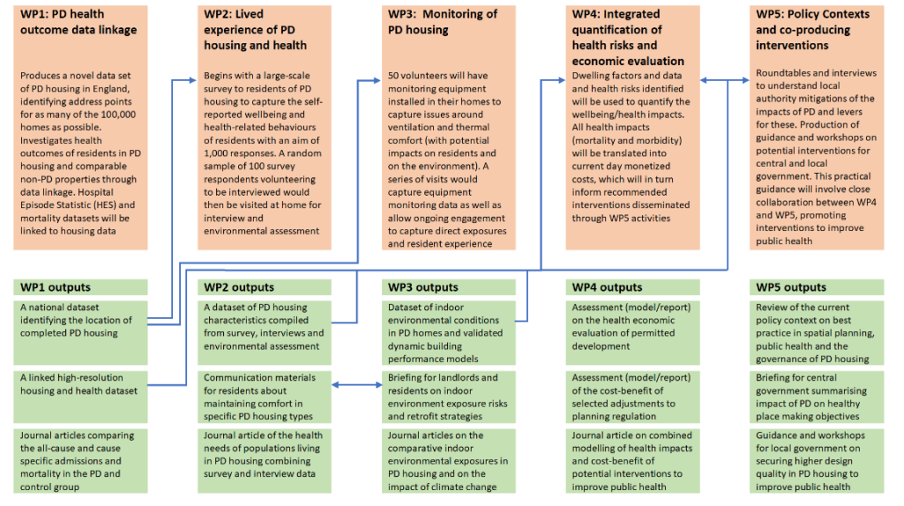UCL Permitted Development Housing Study
Investigating Potential Health Impacts Of Planning Deregulation: The Case Of Permitted Development In England

26 October 2023

Overview
We are interested in housing that is located in a building converted from a previous commercial use, such as offices that are now flats. We are working with our study participants to help us understand how this housing impacts residents’ health and wellbeing and how best to manage such existing properties and govern the development of conversions in future.
This research fills a vital gap in existing work to consider the health impacts and inequalities associated with permitted development (PD) housing in England. This will inform wider policy debate about whether deregulating urban planning supports healthier places.
There is extensive evidence linking various elements of housing quality with health. The factors influencing housing quality are complex and multifaceted, but certainly include the regulatory processes associated with urban planning. The planning system has been extensively reformed over recent years, particularly in England through the expansion of ‘permitted development’ (PD).Clifford et al 2018 and 2020) (Link to paper).
PD is a category of building activity not requiring full planning permission, the consent usually granted by local government for development. Since 2013, a range of commercial buildings, such as offices and warehouses, can be converted to housing under PD. Comparing the design quality of housing created through PD with that approved through full planning permission, our previous research has exposed their lower standards.
We have already engaged some former residents of PD housing and temporary housing (a vulnerable group housed in some PD schemes) to help develop this proposal.
Permitted Development Explained
What is Permitted Development (PD)?
Permitted Development (PD) is a policy that allows for the modification, extension or conversion of a building without requiring a planning application to do the work. It has been possible to undertake certain types of PD conversion since the formal planning system was established in 1948.
In 2013, PD rights were expanded enabling individual houses to be further extended without requiring planning permission and for the larger-scale conversion of offices and industrial buildings into residential use. The changes were introduced to expand the scope of the policy in an attempt to cut perceived ‘red tape’ in the English planning limiting to construction of new homes.
Further changes were introduced in 2021, to require minimum space provisions for homes, access to natural light (but not necessarily windows). Also the PD scope was further expanded to include a wider group of buildings that could be converted, so called ‘class E buildings’ which includes shops and other high street buildings.
Is Permitted Development a Problem?
Not necessarily: done well, old buildings can be converted into good quality homes. Allowing empty office blocks to be converted into flats quickly, without having to apply for planning permission, sounds sensible, because of the shortage of homes. However, planning permission is a form of quality control – where very poor quality conversions wouldn't be allowed. Some developers have hastily converted offices and industrial buildings into flats to make a quick profit and the poor quality of the homes created has raised concerns about the potential risks to residents’ health and wellbeing.
Many PD conversions, especially on the more affordable end, have been found to have no or limited access to natural light, to be poorly insulated and ventilated, to have poor security, and very cramped conditions. Such issues are known to impact our health and mental wellbeing, such as damp and mould from poor ventilation damaging our lungs and making respiratory problems worse. Some PD conversions lack access to outdoor green space or play areas. Some are located in isolated industrial estates, far from public transport, local schools, shops or other essential amenities. For larger conversions, local communities may not be prepared or properly resourced for the influx of new residents, since these conversions avoid the need for developers to make the usual contributions to community infrastructure. This can leave essential services such as schools and GP surgeries ill-equipped for the sudden increase in demand.
It is possible to walk past many of these buildings and have no idea that they have been converted to homes at all. The Town and Country Planning Association commissioned a photography documentary, These are Homes, which highlights the conditions that people are experiencing in some PD conversions. Residents described these properties as ‘worse than prison cells’ and ‘human warehousing’. These are Homes aims to draw attention to the substandard housing that can be produced through PD, often affecting society’s most vulnerable individuals and families.
How many Permitted Development homes are there?
The number of PD conversions is growing all the time. Over 100,000 homes have been converted from offices in England in the last 10 years, but this number is likely to be an underestimate. The Town and Country Planning Association (TCPA) estimate that 120,500 people are living in conversions with just one window (reducing air circulation) and 130,500 people are living in conversions that do not meet the minimum Nationally Described Space Standards.
What is this project aiming to do?
This project brings together a team of researchers to examine the potential health impacts of PD conversions. Whilst recognising that not all homes created through PD will be of poor quality and the country faces a pressing need for genuinely affordable homes, we are keen to examine the current situation in more detail across the country, to gain a fuller picture of the quality of homes that are being produced. We hope to identify where opportunities for improvement can be highlighted and share this with policy makers and developers.
Research
Our project uses overall project governance, co-production and co-learning. Joint academic leads are assisted by an appointed project manager to provide overall governance.
We will be working with a Steering Committee whose members include public health and planning and housing stakeholders, assisted through our collaborators, TCPA involvement.
Our Community and Public Advisory Group who include residents of permitted development (PD) housing will be fully engaged throughout, assisted from previous PD research by PI and through our collaborators Groundswell involvement.
The transdisciplinary research team will engaged through whole project to promote co-learning and integration of all work packages towards the overall project aim. Combined findings from the project as a whole to be disseminated through the final work package, WP5 and through an article for Public Health Research.
- WP1: PD Health Outcome Data Linkage
Identify as many PD homes across England as possible, and identify the demographic, health and socioeconomic characteristics of populations living in PD housing, understanding how this compares to people living in areas with a similar level of socioeconomic deprivation.
Combining planning, construction and address data to form a new dataset of PD homes across England. We will then use data linkage methods to compare housing address with NHS health records and determine the health needs of PD housing occupants compared to occupants of other properties.
- WP2: Lived Experience of PD Housing and Health
Analyse the associations between homes developed via PD, hospital admissions and mortality and how these compare to all-cause and cause-specific morbidity and mortality for populations living in non-PD housing .
Exploring residents’ lived experiences of PD housing through surveys and interviews. The survey will cover demographics, health-related behaviours and household characteristics linked to health. A smaller group will then be interviewed in their home to further explore their health and wellbeing whilst assessing building conditions.
- WP3: Monitoring of PD Housing
Characterise residents’ common health-related behaviours and experiences related to the indoor environment of PD housing, identifying variations across socio-economic status and housing tenure
Environmental monitoring involving equipment being installed in volunteers’ homes to gather data to understand overheating and poor ventilation issues for a sample of PD housing which can be compared to norms for other homes. Modelling will explore potential remedial retrofit strategies under both current and likely future climate conditions.
The study will use Eltek's AQ112 monitor. It is an advanced air quality transmitter which enables detailed monitoring of a site such as a home, school, hospital, office, gallery, or work area - anywhere that air pollution can affect the health of the occupants or the objects and processes within. AQ112 monitors key air pollutants found in the indoor environment which may pose a risk to occupants, such as PM10, PM2.5, NO2, CO and ozone, at fine temporal resolution.
- WP4: Integrated Quantification of Health Risks and Economic Evaluation
Understand the exposures to excess heat and cold and indoor air pollutants of populations living in PD housing.
Assessing the health risks of PD housing through combined analysis of our data, calculating the health economic costs of issues we have identified and comparing these to the costs of potential interventions to address them.
- WP5: Policy Contexts and Co-Producing Interventions
Perform an integrated assessment of all housing-related health risks of homes built under PD, their health economic costs and the potential cost-benefit of altered regulation or required adaptations.
Reviewing the policy ‘levers’ government actors have available to them to ensure that new homes support residents’ health and wellbeing. Focus groups and interviews will establish how these levers are and could be used to improve housing quality to deliver better health outcomes for people.

Team
- Professor Ben Clifford, Principal Investigator
Ben Clifford took up post as ‘Lecturer in Spatial Planning and Government’ within the Bartlett School of Planning at University College London (UCL) at the end of April 2009 and was subsequently promoted to Senior Lecturer and Associate Professor within the School. Born and raised in the exciting ‘edge city’ of Croydon, he is a geographer by background and training. His research on permitted development was recognised with an RTPI prize in 2018. He has academic visiting positions with the University of Melbourne and Public Health England.
- Dr Helen Pineo, Co-Investigator
Dr Helen Pineo is an Associate Professor in Healthy and Sustainable Cities in the Bartlett Faculty of the Built Environment at University College London. Helen’s work focuses broadly on how urban change can support health and sustainability in the context of environmental degradation and equity challenges. Her research approach is informed by her training and industrial experience working as an urban planner in the private and public sectors, both in the UK and internationally.
- Professor Rob Aldridge, Co-Investigator
Rob is a Professor of Public Health Data Science at the Institute of Health Informatics. He qualified in medicine from University College London in 2007, gained an MSc in Epidemiology at The London School of Hygiene and Tropical Medicine in 2010 and completed his PhD in infectious disease epidemiology at University College London in 2015. Prior to studying medicine, he studied Mechanical Engineering at The University of Nottingham and worked in management consultancy.
- Professor Michael Davies, Co-Investigator
Michael Davies is a Professor of Building Physics and Environment at the UCL Institute for Environmental Design and Engineering (IEDE) within The Bartlett, UCL’s global faculty of the built environment. Michael is also a member of the UK Climate Change Committee. For over a decade I have led an extensive programme of research, founded on intimate collaboration with researchers from health and other disciplines, which has sought to understand the complex relationship between the built environment and human well-being.
- Professor Anna Mavrogianni, Co-Investigator
Prof Anna Mavrogianni is Professor of Sustainable, Healthy and Equitable Built Environment at the Institute for Environmental Design and Engineering (IEDE) at the Bartlett Faculty of the Built Environment, UCL. She is an expert in indoor environmental quality, building energy retrofit and climate change adaptation of the built environment sector, with a focus on overheating and heatwave vulnerability at the building and urban scale. Anna trained as an architect engineer specialising in building physics and environmental design.
- Nadia Elsay, Research Project Coordinator
Nadia Elsay is the Project Coordinator for the Permitted Development Housing project at Bartlett School of Planning, UCL. Nadia manages the day to day operations of the project alongside Professor Ben Clifford.Nadia Joined The Institute of Health Informatics, UCL in 2017. Her roles have included coordinating the Preserving antibiotics through safe stewardship research project with Professor Laura Shallcross, the Public Health Data Science Team Coordinator alongside Professor Rob Aldridge and specifically coordinated the development of the Health on the Move App mobile research study. Before joining IHI, Nadia worked in the private sector at KPMG and within wealth management.
- James Milner, Co-Investigator
James research involves mathematical modelling of environmental interventions and their impacts on human health, with a particular focus on assessing the health effects of climate change mitigation actions. James is the module organiser of Environmental Health Policy (PHM206) on the MSc Public Health by Distance Learning. I also act as a personal tutor on the MSc Public Health and lecture on the modules: Environment, Health and Sustainable Development, Environmental Epidemiology and Environmental Health Policy.
- Julia Thrift, Director, Healthier Place Making – TCPA
Julia Thrift joined the TCPA in May 2013 and manages projects concerning planning and public health, green infrastructure, and planning and social justice. Throughout her career she has been interested in the links between the design of the built environment and the quality of people’s lives. She worked for CABE, the Commission for Architecture and the Built Environment, where she was the founding director of CABE Space, the government’s adviser on policy and practice regarding England’s urban parks and public spaces. She began her career as a journalist, writing about design, architecture and art. She has a degree in philosophy from University College London.
- Dr Rosalie Callway, Projects and Policy Manager - TCPA
Dr Rosalie Callway joined us from the University of Bristol, where she was previously Senior Research Associate working on the ‘Tackling the Root Causes Upstream of Unhealthy Urban Development’ (TRUUD) project. She brings over 20 years experience promoting different aspects of sustainability, and a wealth of policy knowledge and expertise. Rosalie leads our Healthy Homes Campaign.
- Sally Roscoe, Project Assistant - TCPA
Sally joined the TCPA in April 2022 to work as a Project Assistant. She supports the delivery of the TCPA’s Healthy Homes campaign and work on climate change. Prior to joining the TCPA, Sally worked in sustainability consulting for the built environment and homebuilding industry. She holds a Master’s degree in Environment and Sustainable Development from University College London, and preceding that she studied geography, sustainability and geology at Hofstra University in New York. As a part of her studies, Sally completed an internship at Nature Connect in Cape Town that focused on conservation and environmental education.
- Lucy Holmes, Creating Change Director - Groundswell
Lucy joined the Groundswell team in January 2022 to lead the Creating Change team. In previous roles at the universities of Edinburgh and Portsmouth and charities Missing People, St Mungo's and Alcohol Change UK, Lucy has published research on topics as wide-ranging as young people and the criminal justice system, prostitution, missing persons, trafficking and county lines, dementia, mental health, homelessness, and alcohol harm. As well as leading research projects, Lucy has been involved in successful campaigns to change legislation, policy, and practice, has developed peer research training courses, and has created and delivered several charity research strategies. Lucy is passionate about creating real-world change by generating and communicating high-quality evidence about what's happening and what works to improve people's lives.
- Mina Sufineyestani
Mina is a postdoctoral research fellow at The Bartlett School of Planning, UCL. She is a social and urban planner with a strong research background in interdisciplinary studies, encompassing planning, architecture, design, sociology, public health, housing policy, and environmental psychology. With international experience in both the public and private sectors, spanning industry and academia, her expertise centres on utilising mixed-methods approaches to investigate people-environment interactions in residential and neighbourhood settings. Her primary focus revolves around issues related to housing, regeneration, sustainability, satisfaction, quality of life, place attachment, fear of crime, ageing, dementia, health, wellbeing, restoration outcomes, and more.
Our Collaborators
TCPA

In practice, our work is a mixture of campaigning, publishing research, acting as a ‘critical friend’, providing training, influencing policy and decision-makers and enabling action. Thousands of people engage with the workshops, conferences, webinars and seminars we run each year. And we seek to work at both the national and local levels.
Groundswell

Participation is at our core because people have the right to be involved in decisions that affect their lives; this leads to better insight and better decisions.
Find out more about Groundswell.
The London School of Hygiene & Tropical Medicine (LSHTM)

 Close
Close

